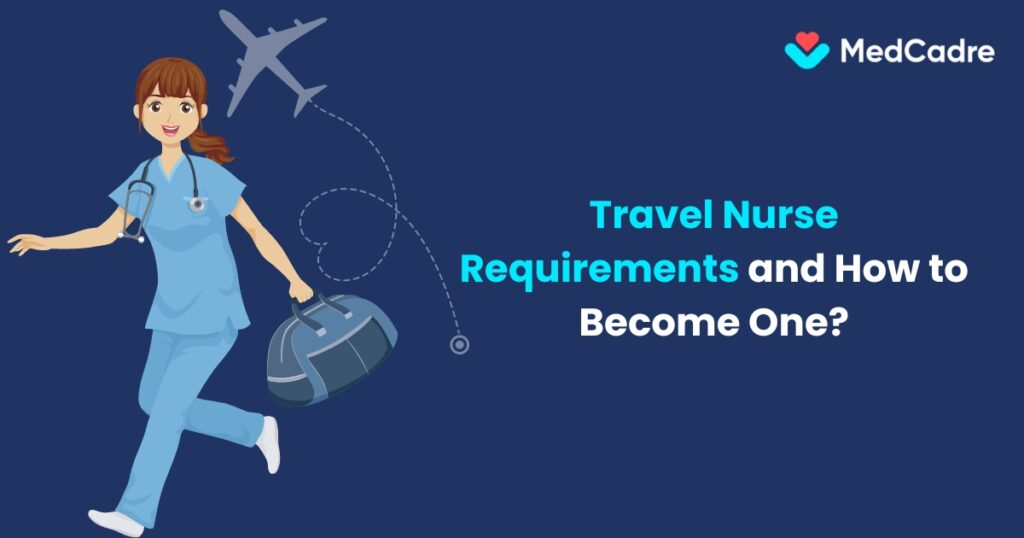Travel nursing offers excitement and rewards, enabling registered nurses to venture into new locations while delivering healthcare across diverse settings. But before you pack your bags and head out on your first assignment, it’s important to understand the requirements and steps to become a travel nurse. This article will explore education requirements, licenses and certifications, clinical experience, skills, personal traits, and the necessary legal requirements. Whether you’re a recent nurse graduate or an experienced nurse, get ready to learn about the ins and outs of travel nurse requirements.
Travel nurse qualifications and education requirements
Obtaining the necessary educational qualifications are crucial to becoming a travel nurse. Typically, a minimum of a Bachelor of Science in Nursing (BSN) degree is required by many facilities. Although some positions may also accept an Associate Degree in Nursing (ADN). BSN is a four-year academic program and ADN is a two-year nursing program. The BSN program equips nurses with a broader knowledge base, enhanced critical thinking skills, and a deeper understanding of nursing practice. In addition to this degree, aspiring travel nurses need to maintain a strong academic record to stand out in this competitive field.
License requirements
Obtaining a valid nursing license is a fundamental requirement for any nurse, including travel nurses. Every state has its board of nursing, and the requirements for licensure may slightly differ from one state to another. The Nursing Licensure Compact program (NLC), established by the National Council of State Boards of Nursing, facilitates multi-state nursing practice. Nurses holding a license from one state within the NLC can provide their services in other participating states without the need to go through additional licensing procedures. Presently, this program encompasses 39 out of the 50 states, enabling eligible nurses to practice more flexibly and effectively across state lines. Typically, applicants must have completed an accredited nursing program and passed the National Council Licensure Examination for Registered Nurses (NCLEX-RN).
Travel nurse certifications
Travel nurse certifications play a vital role in enhancing the skill set and credibility of healthcare professionals. Beyond elevating their clinical capabilities, travel nurse certifications also demonstrate a commitment to continuous learning and professional development. Earning certifications will make these nurses highly sought-after assets in the ever-evolving landscape of healthcare delivery. Here are the top 20 travel nurse certifications that will accelerate your career!
- Certified Nurse Assistant (CNA)
- Medical Assistant
- Basic Life Support (BLS)
- Trauma Nursing Core Course (TNCC)
- Certified Nurse Technician (CNT)
- Certified in Executive Nursing Practice (CENP)
- Legal Nurse Consultant Certified (LNCC)
- Family Nurse Practitioner
- Certified Nurse Educator (CNE)
- Oncology Certified Nurse (OCN)
- Wound Care Certified (WCC)
- Adult, Pediatric, and Neonatal Critical Care Nurses (CCRN)
- Certified Emergency Nurse (CEN)
- Medical-Surgical Nursing (RN-BC)
- Certified Gastroenterology Licensed Vocational/Practical Nurse (LPN/LVN)
- Certified EKG Technician (CET)
- Certified Hospice and Palliative Nurse (CHPN)
- Certified Rehabilitation Registered Nurse (CRRN)
- Registered Medical Assistant APA
- Family Nurse Practitioner (FNP)
Clinical professional experience
Travel nurse clinical experience holds immense value in the healthcare industry. While a minimum of 2 years of work experience is often desirable, the significance of hands-on experience cannot be overstated. Having firsthand knowledge of patient care, medical procedures, and treatment protocols is crucial for providing high-quality care in every ecosystem. Also, it is important to have exposure to diverse facility settings, which demonstrates their adaptability and enriches their clinical capabilities. Experience across different specialties further enhances their versatility and ensures they can take care of emergencies. Whether it’s critical care, pediatrics, or other specialties, a well-rounded travel nurse with extensive clinical experience becomes an invaluable asset.
Read also: Top 10 highest paying travel nursing jobs and specialties
Skill sets and competencies of traveling nurses
Being a travel nurse demands a diverse skill set and competencies beyond basic nursing skills. Apart from clinical expertise, travel nurses should excel in communication, adaptability, and problem-solving. They must be able to quickly familiarize themselves with new healthcare facilities and adapt to varying protocols and technologies.
Essential skill set
- Clinical proficiency in various nursing procedures
- Strong communication skills, both verbal and written
- Critical thinking and clinical judgment abilities
- Flexibility and adaptability to new environments
- Proficiency in utilizing electronic medical records systems
- Knowledge of evidence-based practice and patient safety protocols
Advanced competencies
- Advanced cardiac life support (ACLS) certification
- Pediatric advanced life support (PALS) certification
- Neonatal resuscitation program (NRP) certification
- Specialized certifications depending on the area of expertise (e.g., Critical Care Registered Nurse – CCRN)
Legal and administrative requirements
In addition to the academic, licensure, and skill requirements, travel nurses must also fulfill certain legal and administrative obligations. Each assignment may have varying documentation requirements, such as proof of immunizations, health records, and background checks. Additionally, travel nurses should have a valid driver’s license and reliable transportation to commute to different healthcare facilities. Below are some important points to consider;
State Licensure: Travel nurses must hold a valid nursing license in the state where they intend to practice. The Nurse Licensure Compact (NLC) allows nurses to practice in multiple states with one license, provided they meet specific criteria.
- Background checks and drug screenings: Facilities often require background checks and drug screenings to ensure the safety and integrity of patient care.
- Health requirements and immunizations: Travel nurses are typically required to provide proof of up-to-date immunizations and undergo health assessments to protect both themselves and patients from potential health risks.
- Proof of liability insurance: Travel nurses may need to provide evidence of professional liability insurance to safeguard against potential legal claims.
- Credentialing and privileging: Travel nurses must complete the facility’s credentialing and privileging process, which involves verifying their education, experience, and licensure.
- Compliance with state and facility regulations: Travel nurses must adhere to state-specific regulations and facility policies, ensuring they practice within established guidelines.
- HIPAA and patient confidentiality: Travel nurses are required to uphold patient confidentiality in accordance with the Health Insurance Portability and Accountability Act (HIPAA) and other privacy regulations.
- State-specific documentation: Travel nurses may need to complete additional documentation or forms required by the state or facility they are practicing in.
How to become a travel nurse?
The path to becoming a travel nurse is explained below step by step
1. Gaining a nursing degree
Purse nursing degree with a Bachelor of Science in Nursing (BSN) which is a 4-year program. BSN is mostly preferred by healthcare facilities for better opportunities. However, you can also go with Associate Degree in Nursing (ADN) which is a 2-year program.
2. Take nurse licenses and certifications
Healthcare facilities in each state demand licenses that are compatible with each state. Hence it is important to earn National Compact Licenses (NCLs) and pass examinations. Nurses need to focus on taking certifications in various disciplines and specialties.
3. Gather clinical experience
Once you have your RN license, work for at least a year in a hospital setting. This will not only hone your clinical skills but also provide insights into the intricacies of patient care.
4. Choose a specialty
Decide if you want to specialize in a specific area. Acquiring additional certifications in these areas can significantly boost your profile.
5. Research travel nursing agencies
These agencies play a pivotal role in connecting you with potential assignments. It’s essential to choose an agency that aligns with your aspirations and offers benefits like housing, travel reimbursements, and competitive pay.
6. Document everything
Ensure you have an up-to-date resume, all your licenses, certifications, and any other pertinent documents. This will expedite the process when you find an assignment that interests you.
7. Embrace the adventure
Once everything is in order, it’s time to take the plunge. Choose your assignments, travel to new places, immerse yourself in diverse cultures, and make a tangible difference in the lives of countless patients.
Read also: How to become a travel nurse?
Conclusion
Embarking on a journey as a travel nurse opens the door to a world of opportunities, challenges, and personal growth. As you’ve discovered in this comprehensive guide to travel nurse requirements and how to become one, the path to success will become more clear. If you’re inspired to embrace the adventure of travel nursing, take the first step today by assessing your qualifications, exploring potential assignments, and reaching out to reputable travel nursing agencies.
Start your journey as a travel nurse with MedCadre today and discover a world of possibilities waiting for you. Apply for the latest travel nurse job opportunities!
MedCadre, a trusted healthcare recruiting partner for many nurses! Your next exciting assignment is just a step away!


